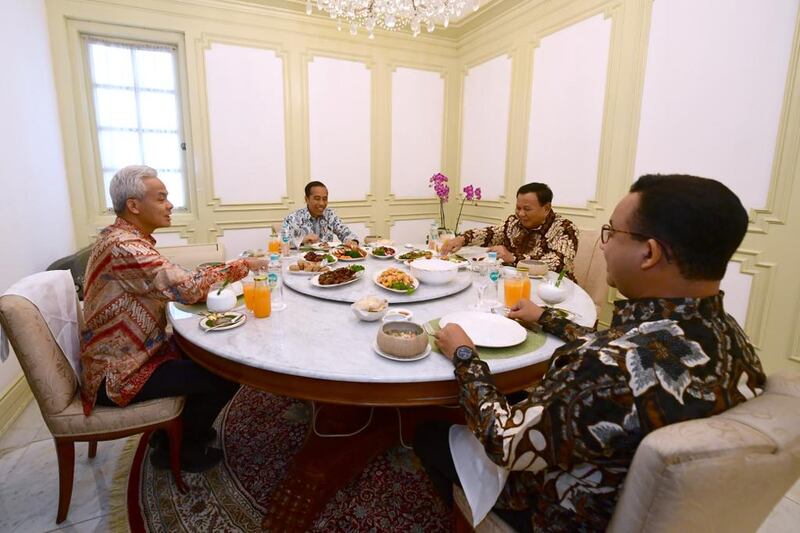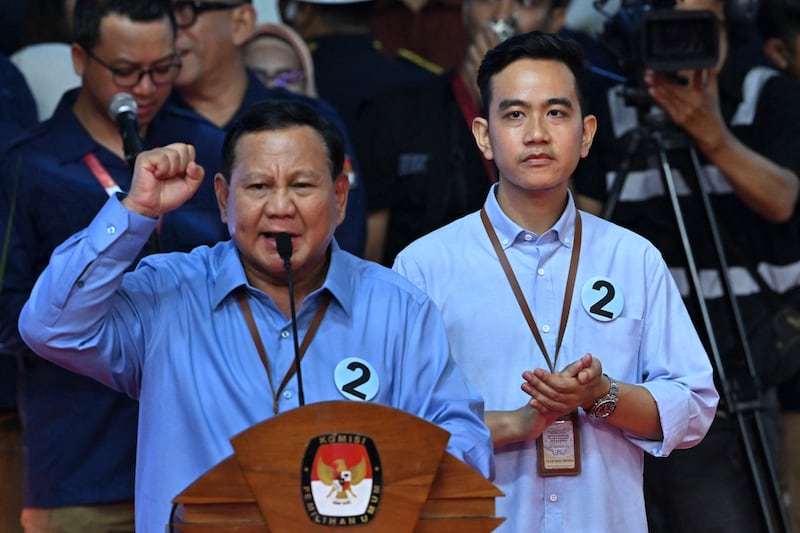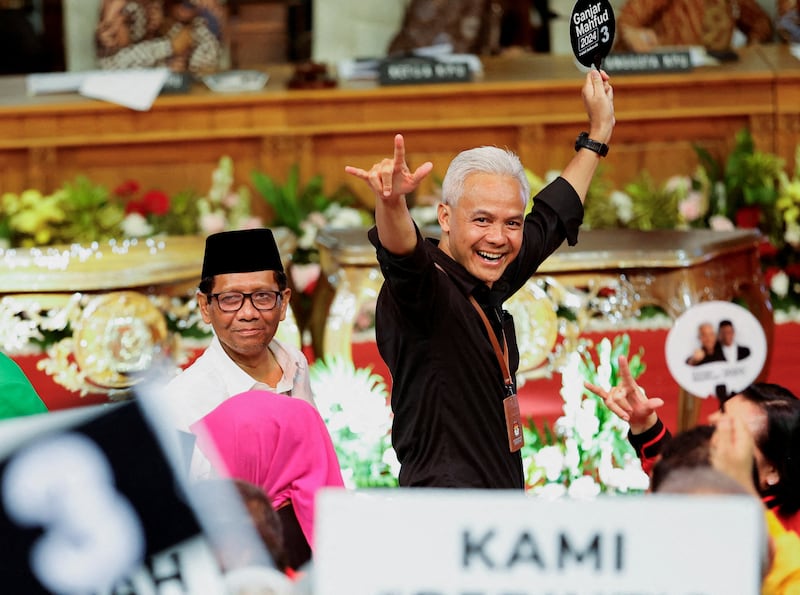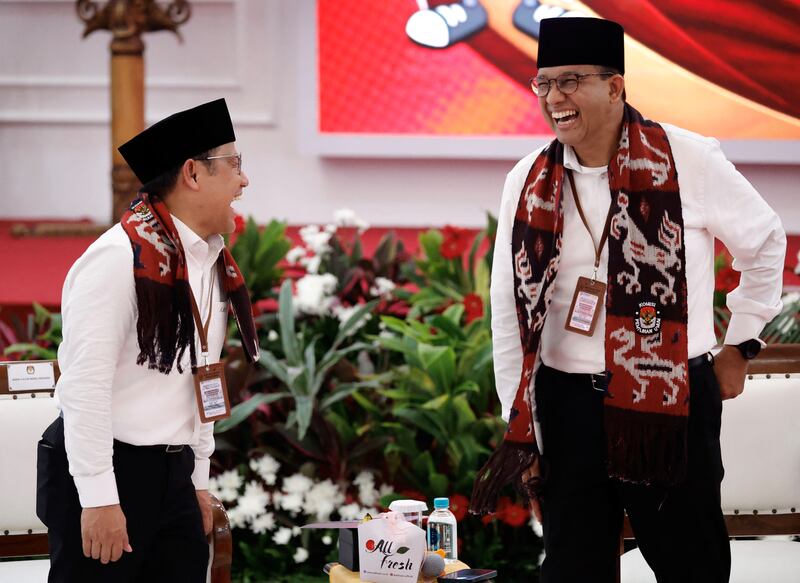Prabowo Subianto, one of Indonesia’s three presidential candidates, has promised to provide free lunch for all schoolchildren, among other pledges, if he is elected to the top office on Feb. 14, 2024.
One of his rivals, the ruling party’s Ganjar Pranowo, has said he would review a contentious job creation law that was pushed by current President Joko “Jokowi” Widodo, while pledging to maintain many of the outgoing leader’s policies.
Meanwhile, the third contender, ex-Jakarta Gov. Anies Baswedan, has promised to shelve Jokowi’s U.S. $33 billion legacy project to build a new capital city and focus instead on alleviating poverty and inequality.
To communicate these and other promises, the three candidates have been campaigning across the sprawling archipelago nation since Nov. 28, trying to woo the nearly 205 million eligible voters with their visions for the future.
They have outlined their policy plans in documents that spell out eight missions in four broad areas: human capital development, economic advancement, environmental protection, and law enforcement with good governance.
Dedi Kurnia Syah, the executive director of Indonesia Political Opinion, a polling agency, said that of the three, Anies, 54, stands out slightly because of his emphasis on equality and justice.
Prabowo, 72, who’s also the defense minister, and Ganjar, 55, presented broader plans on issues such as law enforcement and corruption eradication, which have been perennial challenges in Indonesia.
“On the economy, the three candidates have similar plans,” Dedi told BenarNews.
Jokowi, the two-time president who cannot run again due to constitutional term limits, focused on infrastructure development in the nine years he has led the country. He is due to leave office in October 2024.

Here’s a look at what the three contenders envision achieving if they become the president of Indonesia for the period covering 2024-2029:
Prabowo Subianto: Developed Indonesia by 2045
The front-runner and retired general has named his platform “Asta Cita,” which means “eight goals.”
He aims for a “Golden Indonesia” by 2045, the centennial of the nation’s independence. The term refers to the aspiration to make the Southeast Asian nation a prosperous country that is respected around the world.
Towards that end, Prabowo’s platform is centered on economic development, social welfare, and national security.
His pledges include:
- Providing free lunches and milk at schools, as well as nutritional assistance for toddlers and pregnant women.
- Organizing free health screenings, reducing tuberculosis cases by 50% in five years, and building fully equipped hospitals in every regency.

- Cutting the national debt by 50% in five years.
- Beefing up the military and police to protect national sovereignty.
- Raising the salaries of civil servants, especially teachers, university lecturers, and healthcare workers.
- Achieving self-sufficiency in food, energy and water.
Dedi, of Indonesia Political Opinion, criticized Prabowo’s promise of providing a free lunch for all school students in the country.
“Free lunches should not be given to all students, as not all of them are malnourished,” he said.
He believes it would be more rational to increase the national education budget and provide school facilities in rural areas.
Ganjar Pranowo: Economic growth, maritime development
The former governor of Central Java province aims to transform Indonesia into a leading maritime nation by boosting the country’s sea connectivity, marine industry and coastal tourism.
Additionally, his platform focuses on job creation and economic growth.
Ganjar’s pledges include:
- Creating 17 million new jobs to ensure that all Indonesians find work.
- Improving the quality of sea transportation, and ensuring the most effective use of sea lanes.
- Strengthening the shipbuilding and fishing industries, conserving the sea and coral reefs, increasing the welfare of fishermen as well as the contribution of the maritime economy to the gross domestic product (GDP).

- Achieving average economic growth of 7% to help Indonesia escape the middle-income trap and transition to a high-income economy.
- Providing free healthcare at every community health center known as Puskesmas.
- Making education free nationwide for 12 years.
- Reducing poverty to 2.5% and ending extreme poverty.
Ganjar is mostly looking to stay on Jokowi’s path, said Hendri Satrio, a political lecturer at Paramadina University in Jakarta.
“Ganjar is about improvement, so his platform is about how to improve the development that Jokowi has implemented,” Hendri told BenarNews.
Anies Baswedan: Just, prosperous society for all
His electoral pledge says that he will create a just and prosperous society for all Indonesians.
Anies’ aim is to eradicate poverty and inequality, ensuring that every Indonesian has access to quality public services, including healthcare, education, housing, and affordable living costs.

His platform includes the following key pledges:
- Achieving social justice and economic prosperity by lowering the poverty rate to 4%-5% by 2029, from 9.36% in March 2023, and eliminating extreme poverty by 2026.
- Generating more than 15 million new jobs, including green jobs, from 2025 to 2029.
- Strengthening democracy and human rights, ensuring good governance, and combating corruption.
- Improving the quality of education and health, and promoting science and technology.
- Safeguarding women’s rights by preventing violence and discrimination against women; providing integrated crisis services, free health and psychological services for victims of violence.
Paramadina University lecturer Hendri said that the goals Anies wants to achieve are far apart from that of the current administration.
“Anies Baswedan is carrying the banner of change, so his platform is about a departure from Jokowi’s government,” he said.
“Voters who want serious change are likely to vote for Anies.”

